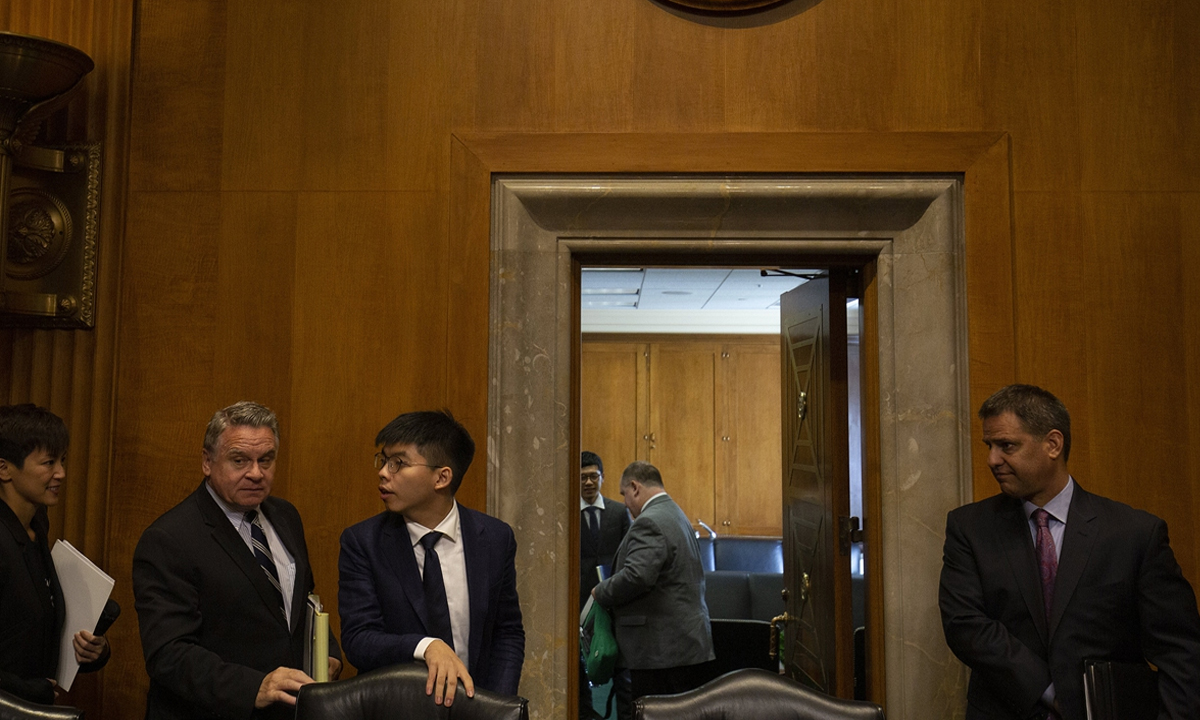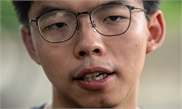Joshua Wong's guilty plea 'another political performance': experts

Hong Kong secessionist Joshua Wong (3rd L) leaves after a hearing at the Congressional-Executive Commission on China in Washington, DC, on September 17, 2019. Photo: AFP
Hong Kong secessionist Joshua Wong Chi-fung pleaded guilty to two charges of inciting and organizing an unauthorized assembly in a siege of the headquarters of the Hong Kong Police Force (HKPF) in June 2019, which experts noted was "another political performance."
Wong's fellow secessionists and long-time colleagues Agnes Chow Ting and Ivan Lam also pleaded guilty to charges related to the same siege earlier on Monday morning. The three were taken away ahead of a sentencing hearing on Dec 2, where they could face a maximum of five years in prison if convicted, local media reported.
Wong faced three charges and pleaded guilty to two counts of organizing and taking part in an unauthorized assembly, and was acquitted of the charge of participating in an unauthorized assembly.
Later on Monday, Chinese Foreign Ministry spokesperson Zhao Lijian expressed support for the Hong Kong Special Administrative Region (HKSAR) government to carry out responsibilities to safeguard Hong Kong.
"This is not a diplomatic problem. We support relevant departments of HKSAR government to perform their functions in accordance with the law," Zhao said.
Wong was among the most infamous figures in the prolonged secessionist riots in the HKSAR from 2019. As the co-founder of the secessionist social group Demosisto, he announced the group's disbandment hours after the central government passed the national security law in Hong Kong in June.
"Since the national security law was introduced in Hong Kong, the social atmosphere has left no room for the secessionists to run riot again," Tang Fei, a member of the Chinese Association of Hong Kong and Macao Studies, told the Global Times. "For Wong and his fellow secessionists, their lawyers probably advised them to make this guilty plea. As they have realized that they could not continue making trouble, they took guilty pleas to get a reduced sentence."
The guilty plea was yet another political performance by Wong and the others, Tang noted.
"When they are unable to make trouble, they hope to attract political attention again by going to prison," Tang said, "It is more like a halo for these people, accumulating political capital for their subsequent elections."
Earlier in July, Wong and 11 other secessionists were disqualified from running in the general elections of the Hong Kong Legislative Council (LegCo), which were originally scheduled for September but postponed over COVID-19 epidemic concerns, by the Electoral Affairs Commission (EAC) in July, as they failed to meet the requirements of the elections, in addition to being infamous for their misdeeds. While the EAC can decide whether lawmaker candidates can pursue their positions, the disqualification of incumbent lawmakers requires a two-thirds majority vote from LegCo members.
Li Xiaobing, an expert on Hong Kong, Macao and Taiwan studies at Nankai University in Tianjin, told the Global Times that the guilty plea from Wong and the others proves that the prosecution had sufficient evidence to convict the rioters.
"But it is not enough to prosecute and convict. A number of recent cases with over-lenient sentences are evidence of the persistent instability in Hong Kong's judicial system," Li said.
Judicial reform in Hong Kong will be an important factor in determining whether order and stability can be fully restored in the future, Li noted, adding If the judicial system can heed the voices of the public and carry out comprehensive reform, only then can Hong Kong move towards a truly law-abiding society.

